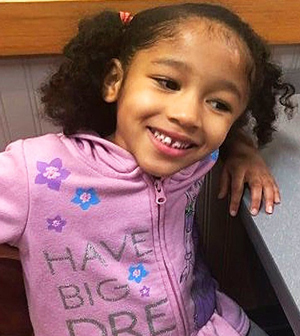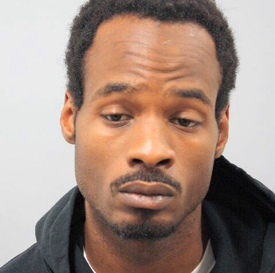Missing Maleah - The profound problem of children, boyfriends and dangers in the 'hood
By Michael Z. Muhammad, Contributing Writer | Last updated: May 22, 2019 - 11:08:48 AMWhat's your opinion on this article?

Maleah Davis Photo: MGN Online
|
After police found traces of blood evidence linked to Maleah in a bathroom and hallway of the apartment he shared with Brittany Bowens and her daughter Maleah, Mr. Vence was charged with tampering with evidence of a human corpse. According to police, spots where blood had been cleaned up were also found.
Her remains have not been recovered.
As balloons in her memory go up and events in her honor are organized, what is not reported is the conundrum Black people, in particular, and families often find themselves in. Nothing in America works fully for their benefit.
Then her case, in some ways, seemed overshadowed as a police officer shot a Black woman to death May 13 in Baytown, Texas, about 25 miles east of Houston. Pamela Turner, who was unarmed and who family members say was non-violent, was killed as an officer tried to arrest her.

Derion Vence, the man who reported 4-year-old Maleah Davis had been abducted from him last weekend, was arrested near Houston May 11.
|
Murder is the leading cause of death among Black youth ages 15 to 24. The Black Child Legacy Campaign astonishingly reports in California child abuse and neglect homicides were the third highest disproportionate cause of death from 1990-2009: “30 percent of decedents were African American children but only comprised 11 percent of the child population.” Their study also looked at child abuse and neglect homicide (a homicide where the perpetrator is the primary caregiver; a death in which a child is killed, either directly, or indirectly, by his/her caregiver). Seventy-seven percent of the child abuse and neglect homicides of Black children occurred in children 0 to 5 years of age. Sixty-one percent of the perpetrators of Black victims of child abuse and neglect homicides were the biological parents. This includes the mother or father acting alone, or both parents acting together.
Philadelphia child welfare social worker Lakesha Reel, who has closely followed Maleah’s case on social media, said the case narrative is not uncommon. “In terms of poor CPS intervention, faulty interviews are usually at the core,” she noted.
Ms. Reel pointed out there are abuse indicators such as bodily injury with family stress or crisis caused by domestic violence, relationship turmoil, separation, or divorce.
In Maleah’s case, she was spot-on. What is known, according to reports, is the child was left in the care of her mother’s paramour, Mr. Vence, while she attended a funeral out of town. In a shifting story, he claimed he was attacked while driving to the airport to pick up Ms. Bowens and Maleah was taken. The child was last seen entering her apartment complex on April 30 with Mr. Vence. According to Houston community activist Quanell X, Ms. Bowens recently broke off her engagement with Mr. Vence after she allegedly discovered he sent sexually explicit images of himself to another man. “She told him that she was giving back his ring and that she was not going to marry him,” Quanell X said. In an interview with The Final Call, he said Mr. Vence had been abusive toward the child in the past and threatened the mother. All three of Ms. Bowens’ children were involved with Child Protective Services, having been removed from the home in 2018. Maleah had multiple brain surgeries for an unexplained injury and she and her two brothers were removed from their residence by the Texas Department of Family and Protective Services as a consequence. They were returned in February, authorities told CNN. Quanell X said based on conversations with the mother, there was physical abuse against Maleah at the hands of the paramour that was covered up.
“The mother had a binding obligation to protect her daughter, and she failed. Actually, the child had been removed twice from her care. The twist here is the child returned because CPS couldn’t determine who committed the abuse the mother or boyfriend. It was a huge mistake by the agency in terms of child safety,” Quanell X said.
Further exacerbating the problem, according to Quanell X, are claims the boyfriend may have also been molesting Maleah. As for the involvement of Child Protective Services, Quanell said minimal services were provided for the family. “What little services were offered, Mr. Vence never completed any. CPS is directly to blame for the death of young Maleah. The mother also has to live with the painful truth that she should have done a much better job of getting away from that man or allowing him to be in a private setting around that child,” Quanell X asserted. Ms. Reel concluded the same, saying mothers need to be more vigilant in protecting their children. “Leaving children in the care of boyfriends and other unreliable caregivers is all too common in the ’hood and dangerous,” she said.
INSIDE STORIES AND REVIEWS
-
-
About Harriett ... and the Negro Hollywood Road Show
By Rabiah Muhammad, Guest Columnist » Full Story -
Skepticism greets Jay-Z, NFL talk of inspiring change
By Bryan 18X Crawford and Richard B. Muhammad The Final Call Newspaper @TheFinalCall » Full Story -
The painful problem of Black girls and suicide
By Charlene Muhammad -National Correspondent- » Full Story -
Exploitation of Innocence - Report: Perceptions, policies hurting Black girls
By Charlene Muhammad -National Correspondent- » Full Story -
Big Ballin: Big ideas fuel a father’s Big Baller Brand and brash business sense
By Bryan Crawford -Contributing Writer- » Full Story






 Click Here Stay Connected!
Click Here Stay Connected!








